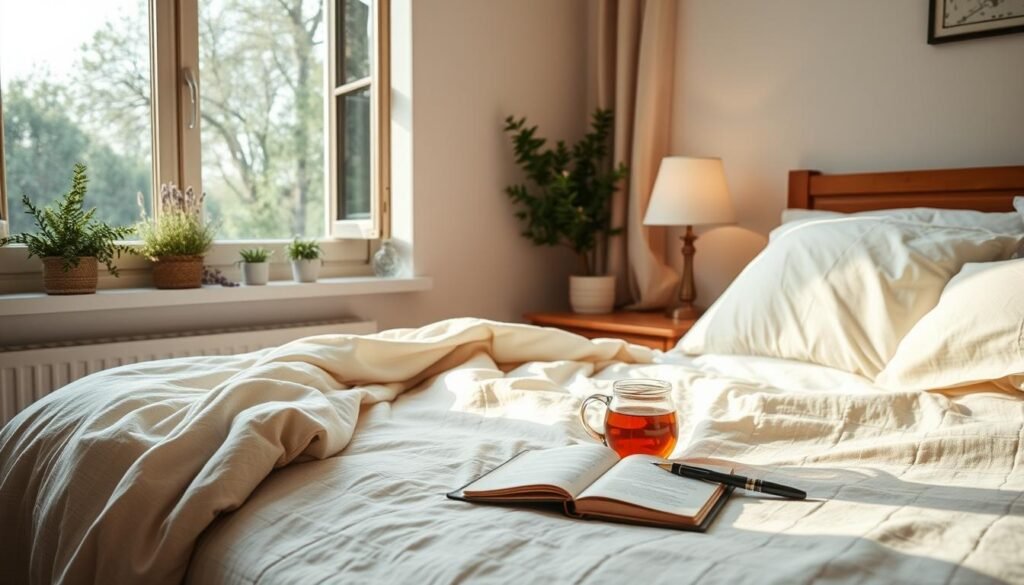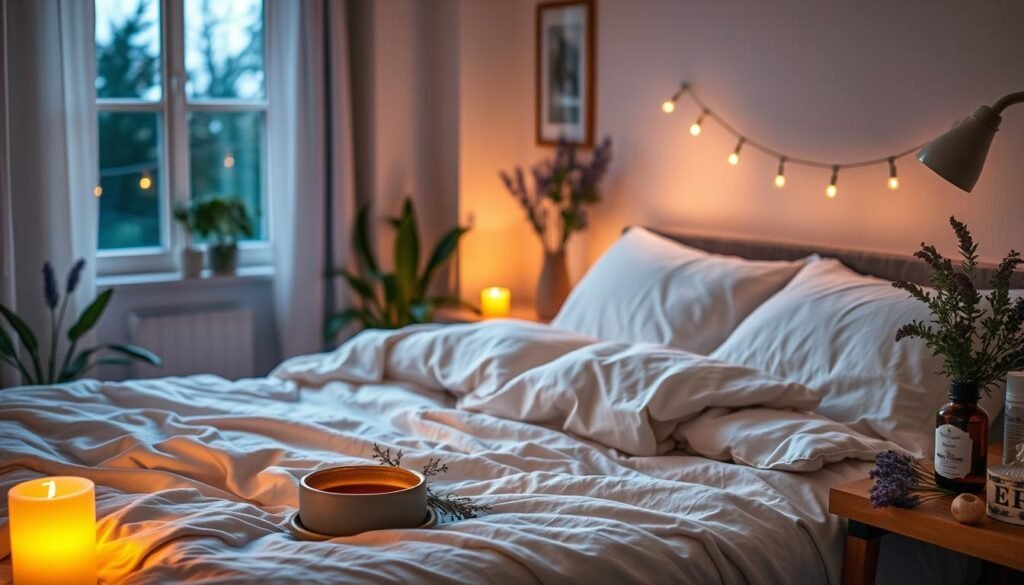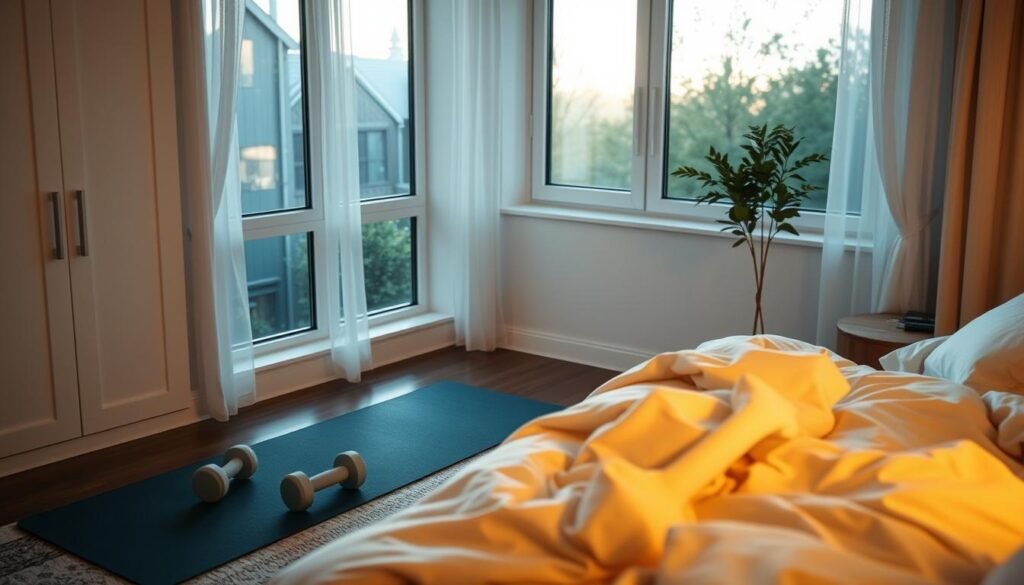Did you know over 60 million Americans can’t sleep well at night? This big number shows a major issue—finding how to sleep better. The dangers of not sleeping enough include more risks of getting heart disease, diabetes, and even cancer. It’s clear that sleeping well is very important for staying healthy. Luckily, lots of people are now choosing natural treatment for insomnia. They prefer this to avoid the side effects of drugs.
In this article, we’ll talk about natural remedies, good practices, and changes in our daily lives to sleep better. Things like taking melatonin, using essential oils, and practicing mindfulness can help. By adding good sleep habits and natural solutions, you can start sleeping better. If you need more detailed help, there are plenty of insomnia solutions and tips available for you.
Going further, we’ll see the good points of natural treatments. We’ll talk about herbal remedies, how to relax, and making your bedroom the best place for sleep.
Key Takeaways
- Chronic insomnia affects over 60 million Americans.
- Natural treatments like melatonin and herbal teas can greatly better your sleep.
- Using mindfulness and relaxation methods can overcome sleep issues.
- Making your sleeping area better is key for good sleep.
- Keeping a consistent sleep time helps your overall health a lot.
Understanding Insomnia
Insomnia is a common sleep issue that many face. People with it struggle to start sleeping or stay asleep. It affects not just nightly rest but also overall health.
Definition of Insomnia
Insomnia includes various sleep problems. Issues like not falling asleep easily, waking up often, and early rising are signs. These problems can hurt how you function daily and feel emotionally.
Common Symptoms
Knowing insomnia symptoms is key for early help. Common symptoms include:
- Difficulty falling asleep at night
- Waking up frequently during the night
- Feeling tired or unrefreshed upon waking
- Daytime fatigue and sleepiness
- Poor concentration and irritability
Impact on Quality of Life
Insomnia greatly affects life quality, causing cognitve issues and mood changes. It lowers satisfaction in life. Not sleeping well can also lead to problems like anxiety, depression, and heart issues. Dealing with insomnia can make sleep and life better overall.
Natural Treatment for Insomnia
Finding natural treatments for insomnia can change lives. Many people now choose holistic solutions. They focus on improving sleep and overall well-being. Let’s explore some effective natural remedies.
Overview of Effective Remedies
There are various natural remedies for insomnia. They fit different needs and tastes. They include:
- Melatonin: This natural hormone helps you fall asleep faster. Most people find 0.1 to 0.3 milligrams enough.
- Valerian Root: This herb might help you fall asleep quicker and sleep better, usually taken an hour before bed.
- Chamomile: Known for its calming effects, chamomile is a popular herb for sleep.
- Tryptophan: This amino acid, found in turkey and milk, helps produce serotonin which aids sleep.
- Magnesium: It helps relax muscles, which is good for people with insomnia.
Benefits of Choosing Natural Treatments
Choosing natural remedies for insomnia offers benefits:
- Fewer Side Effects: Natural treatments like chamomile and valerian root tend to have fewer side effects than drugs.
- Holistic Solutions: They support both sleep and overall health.
- Lower Risk of Dependency: You’re less likely to become dependent on natural remedies than on some medications.
Tailoring these options to your needs can boost your sleep quality. Embracing natural remedies helps improve daily life and mood too.
Herbal Remedies for Sleep
Many people look for natural ways to sleep better. They find hope in what nature offers. Here are some herbal options to consider for better sleep.
Chamomile: A Gentle Sleep Aid
Chamomile tea is famous for its ability to calm and soothe. It is a favorite for those who have trouble sleeping. Drinking chamomile consistently can help improve sleep. It is especially effective for older adults. The FDA considers it safe, making it a good option for many.
Valerian Root: Promoting Relaxation
Valerian root is known to help with sleep. You can find it in teas and as a supplement. Taking 400-900 milligrams before bedtime can make falling asleep easier. It can also lead to a deeper sleep. However, it may not mix well with all medicines.
Lavender Oil: Aromatherapy for a Better Night
Using lavender oil in aromatherapy can improve sleep. It is especially helpful for people with anxiety or heart issues. Its soothing scent can make your bedroom a calm place for sleep.
Non-Pharmaceutical Sleep Solutions
Many people look for sleep solutions that don’t involve drugs. They often turn to melatonin and magnesium supplements. These options can improve sleep without the side effects tied to sleeping pills.
Melatonin: The Natural Sleep Hormone
Melatonin helps control when we sleep and wake up. It’s made in the brain and starts working about four hours before bedtime. Melatonin is also good for dealing with jet lag or odd work hours. Studies show it helps improve sleep for those with certain medical issues.
Magnesium Supplements: For Muscle Relaxation
Magnesium plays a key role in relaxation and stress reduction. A 2012 study showed that taking 500 milligrams of magnesium daily for two months lowered insomnia symptoms. It led to better sleep. This shows how magnesium is a valuable sleep aid without needing drugs.

| Sleep Aid | Main Benefits | Recommended Dosage |
|---|---|---|
| Melatonin | Regulates sleep-wake cycle, aids in jet lag | 0.5 – 5 mg about 30 minutes before bedtime |
| Magnesium | Muscle relaxation, reduces anxiety, improves sleep quality | 200 – 400 mg daily |
Using these non-drug sleep solutions might help you sleep better. With over 60 million Americans struggling with sleep, melatonin and magnesium are beacons of hope. They can improve your sleep and overall life quality.
Mindfulness Practices for Sleep
Mindfulness practices are becoming popular for improving sleep. They help us pay attention to our thoughts and feelings without judgment. This method tackles insomnia by lowering stress and anxiety. These are the main issues that stop us from sleeping well.
The Role of Mindfulness in Sleep Quality
Studies show mindfulness can help with sleep troubles. About 30% of Americans don’t get enough sleep. Up to 15% have problems during the day because they’re tired. Stress is a big reason for this, affecting 43% of people.
Using mindfulness helps people relax and sleep better. It makes it easier to fall asleep and improves the quality of sleep.
Effective Techniques: Meditation and Mantras
Meditation and mantras are good for sleep. They help calm the mind. Just ten minutes of mindfulness a few times a day can make a big difference. It shifts focus from worries to calm.
Structured mindfulness reduces stress. It also makes you kinder to yourself. This can lead to better sleep patterns.
| Mindfulness Technique | Benefits | Recommended Duration |
|---|---|---|
| Meditation | Reduces stress and improves sleep quality | 10-20 minutes, several times a week |
| Mantra Repetition | Encourages focus and mental calmness | 5-15 minutes, before bedtime |
| Breath Awareness | Promotes relaxation and a mindful state | 5-10 minutes, when stressed |
These mindfulness practices can bring peace and a feeling of safety. They make a good environment for sleep. People with insomnia might find these techniques a strong option instead of usual treatments.
Relaxation Techniques for Better Sleep
Struggling with insomnia? Trying effective relaxation techniques nightly can really change things. Techniques like Progressive Muscle Relaxation (PMR) and deep breathing help get you ready for sleep. They also relieve stress, which is key for combating night-time problems.
Progressive Muscle Relaxation (PMR)
Progressive Muscle Relaxation, or PMR, helps you relax physically and mentally. It involves tensing and then relaxing your muscles one group at a time. By noticing the difference between tension and relaxation, you can feel calmer. Studies show 20 to 25 minutes of PMR daily can reduce stress significantly.
Deep Breathing Exercises
Deep breathing is a simple but powerful way to relax. It involves taking slow, deep breaths. A well-known technique is the 4-7-8 method, where you inhale for four counts, hold for seven, and exhale for eight. This helps calm your nervous system, slows your heart, and gives you a moment of peace. Doing this for five minutes before bed can make it easier to fall asleep.
PMR and deep breathing not only reduce tension but also boost your emotional state. By adding these techniques to your bedtime, you’re more likely to enjoy restful sleep. With 80% of people facing sleep issues, these methods could be a game-changer. Consistent practice leads to a calmer mind and body, helping you sleep better.

Holistic Approaches to Insomnia
To beat insomnia, using several strategies together helps a lot. Holistic ways focus on changing your lifestyle to sleep better. Adjusting your daily habits can make a big difference in getting peaceful sleep.
The Importance of Lifestyle Changes
Making lifestyle changes is key to better sleep. Important changes include:
- Maintaining a consistent sleep schedule.
- Avoiding stimulants like caffeine and alcohol in the evening.
- Doing relaxing activities before bed to get ready for sleep.
- Cutting down on screen time an hour before bed to help with melatonin.
- Eating lighter meals at night to avoid discomfort.
These habits lead to a healthier lifestyle and better sleep. Also, looking into naturopathic methods can offer extra help for insomnia.
Yoga and Stretching for Stress Relief
Yoga for sleep and simple stretches are great for easing stress. They release the day’s tension, making your mind and body ready for sleep. The main benefits are:
- Helping you relax and feel less anxious.
- Improving how flexible you are and easing muscle tightness.
- Increasing mindfulness and living in the moment.
Research shows that adding yoga and stretching to your night routine improves sleep quality. These practices address both your mind and body, playing a big role in tackling insomnia holistically.
Exercise and Sleep Quality
Adding exercise to your daily life can improve your sleep. Studies show that being active helps those with insomnia. Regular workouts can make it easier to fall asleep and boost your mood.
Benefits of Regular Physical Activity
Being active is good for more than just your body. Key benefits include:
- Improved Sleep Quality: Regular exercisers get deeper, more refreshing sleep.
- Faster Sleep Onset: People who do moderate aerobic activities fall asleep quicker, about 13 minutes faster.
- Reduced Pre-Sleep Anxiety: Working out lowers anxiety, making it easier to relax at night.
- Increased Deep Sleep: Moderate exercise leads to more deep sleep, which is essential for your health.
Recommended Exercise Types for Insomnia
Pick exercises you enjoy for better sleep. Some effective ones are:
| Exercise Type | Duration & Frequency | Benefits for Sleep Quality |
|---|---|---|
| Walking | 30 minutes most days | Improves mood and reduces anxiety |
| Swimming | 30 minutes three times a week | Enhances relaxation and lowers stress |
| Yoga | 30-60 minutes per session | Promotes relaxation and mindfulness |
| Cycling | 30-60 minutes at moderate intensity | Improves cardiovascular health and aids sleep |
Trying these exercises can greatly improve your sleep. It’s best to exercise earlier in the day. This gives your body time to relax before bedtime. Finding activities you enjoy can help you stick to a regular exercise routine.

Sleep Hygiene: Creating a Sleep-Friendly Environment
Having good sleep hygiene is key to resting well and feeling better overall. By sticking to a regular sleep schedule and making your bedroom sleep-friendly, your sleep can get much better.
Importance of Consistent Sleep Schedules
Keeping a regular sleep schedule sets your body’s clock right. Sleeping and waking up at the same times every day help your body find its natural sleep rhythm. This can make falling asleep easier and reduce tiredness during the day.
Staying on a sleep schedule has *positive reinforcement*. It helps your body know when it’s time to sleep.
Optimal Bedroom Conditions for Sleep
For better sleep hygiene, it’s important to have the right bedroom conditions. Making your bedroom a peaceful place can greatly help with sleep. Think about these tips:
- Keep bedroom temperatures between 60°F to 67°F (15.6°C to 19.4°C) for the best comfort.
- Use blackout curtains to block light, and turn off screens an hour before bed.
- Use earplugs or white noise machines to keep it quiet and peaceful.
- Pick a good mattress and pillows, replacing any mattress over ten years old.
Good sleep hygiene boosts health and efficiency by removing distractions and discomfort. Following these tips will help you create habits for better sleep. This reduces the chances of problems caused by not getting enough sleep.
Conclusion
Exploring natural treatments for insomnia offers many effective strategies to help improve sleep. Herbal remedies, mindfulness, and changing lifestyle habits are options. People can choose what works best for them. For example, valerian root and chamomile can help enhance sleep, showing they’re promising natural remedies.
Even though some studies show herbal treatments and placebos have similar effects, many see improvements in how fast they fall asleep and sleep quality. This suggests a good turn for those wanting alternatives to medicine. Using a holistic approach lets people manage their sleep health with fewer side effects than traditional drugs.
By trying these different methods, one might enjoy a more restful sleep. This can help people do better in their day-to-day activities. Choosing natural treatments for insomnia means you can get better sleep without depending on drugs.